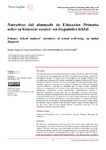Narrativas del alumnado de Educación Primaria sobre su bienestar escolar: un diagnóstico inicial

Use este enlace para citar
http://hdl.handle.net/2183/32767
A non ser que se indique outra cousa, a licenza do ítem descríbese como Atribución-NoComercial-SinDerivadas 3.0 España
Coleccións
- Investigación (FEDU) [938]
Metadatos
Mostrar o rexistro completo do ítemTítulo
Narrativas del alumnado de Educación Primaria sobre su bienestar escolar: un diagnóstico inicialTítulo(s) alternativo(s)
Primary School students’ narratives of school well-being: an initial diagnosisData
2022-04-30Cita bibliográfica
Requejo, E.; Losada-Puente, L.; Rebollo-Quintela, N. y Mendiri, P. (2022). Narrativas del alumnado de Educación Primaria sobre su bienestar escolar: un diagnóstico inicial. Revista de Investigación en Educación, 20(1), 5-20. https://doi.org/10.35869/reined.v20i1.3964
Resumo
[Resumen] El interés por conocer el bienestar dentro de los centros educativos, sobre todo, desde la perspectiva de sus protagonistas, los niños y las niñas, ocupa un lugar central en la investigación actual. El objetivo de la investigación fue indagar acerca de los indicadores que configuran el bienestar escolar del alumnado de Educación Primaria. Se realizó un estudio cualitativo, en el que participaron 95 estudiantes de dos centros educativos públicos, a los que se les aplicó el Cuestionario Abierto de Bienestar Escolar (CABES). El discurso del alumnado giró en torno a cuatro elementos relativos a su experiencia en la escuela: clima escolar (relacional, de seguridad y de aprendizaje), compromiso escolar (dimensiones comportamental, afectiva y cognitiva), emociones (relacionadas con las actividades escolares, epistémicas, temáticas y sociales) y discontinuidad educativa (diferenciación de roles y contextos, y relación familia-escuela). En definitiva, el mundo escolar representa un espacio de experiencias que resultan significativas y que son percibidas y vivenciadas de forma diferente por cada estudiante, no resultando posible referir una única ni común forma de expresar lo que se entiende como bienestar escolar, aunque sí definir algunos de sus ejes clave. Solo así será posible plantear actuaciones coherentes con las necesidades expresadas por el alumnado. [Abstract] The interest in understanding well-being within educational centers, especially from the perspective of its main actors, boys and girls, occupies a central place in current research. The aim of the study was to investigate the indicators that shape the school well-being of primary school pupils. A qualitative study was carried out, in which 95 students from two public schools participated. They were administrated the Open-ended Questionnaire of School Well-being (OQSW). Four elements about students’ experience at school were drawn from their discourse: school climate (relational, safety, and learning), school engagement (behavioral, affective, and cognitive domains), emotions (related to school activities, epistemic, thematic, and social) and educational discontinuity (role and context differentiation, family-school relationship). In short, the school world represents a space of significant experiences, that are perceived and felt differently by each student. There is no possible to refer to a single or common manner of expressing what school well-being means, although it is possible to define some of its key axes. This is the only way to propose actions that are coherent with the needs expressed by the students.
Palabras chave
Bienestar del estudiante
Clima
Actitud hacia la escuela
Emoción
Investigación cualitativa
Student wellbeing
Climate
School attitude
Emotion
Qualitative research
Clima
Actitud hacia la escuela
Emoción
Investigación cualitativa
Student wellbeing
Climate
School attitude
Emotion
Qualitative research
Versión do editor
Dereitos
Atribución-NoComercial-SinDerivadas 3.0 España
ISSN
1697-5200






